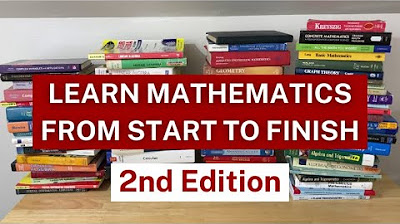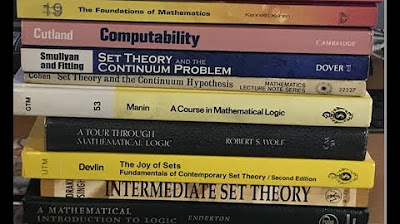Learn Mathematics from START to FINISH
TLDRIn this video, the presenter guides viewers on a self-study journey through mathematics, starting from basic logic and proofs to advanced topics like calculus and differential equations. The video recommends a sequence of books for beginners to progressively build their mathematical knowledge, emphasizing that understanding proofs is crucial. It encourages learners to explore their interests and not be discouraged by difficulties, as math is a challenging field that rewards persistence and curiosity.
Takeaways
- 📚 Start with foundational books on discrete mathematics and proof writing to build a strong base in logic and mathematical reasoning.
- 🔢 Begin learning mathematics with 'Discrete Mathematics with Applications' by Susannah Epp and a beginner-friendly alternative like Coleman Busby and Roz's book.
- 📈 Progress to pre-algebra and college algebra to refresh and solidify basic mathematical concepts and skills.
- 📊 Move on to more advanced topics like precalculus and trigonometry, using resources like the instructor's edition by Hornsby, Lyle, and Roxwoold for guided practice.
- 🌟 Dive into calculus with popular textbooks like James Stewart's 'Calculus' and Michael Spivak's 'Calculus' for a deeper understanding of the subject.
- 🔄 After calculus, explore differential equations to understand how to solve them using integration techniques learned earlier.
- 📐 Continue with linear algebra, a crucial subject for further mathematical studies, using books like Howard Anton's 'Elementary Linear Algebra' for beginners.
- 🔍 For those interested in statistics, a solid choice of book is available to apply the knowledge of calculus and linear algebra.
- 🎓 The journey through self-study math can open up to various undergraduate and even graduate-level subjects like complex variables, real analysis, and abstract algebra.
- 💡 Remember that the learning process is iterative; it's okay to get stuck, move on, and return to difficult concepts later with a refreshed perspective.
- 🌐 The video script provides a comprehensive roadmap for self-study in mathematics, encouraging exploration of interests and a deep understanding of the subject.
Q & A
What is the main topic of the video?
-The main topic of the video is about teaching oneself mathematics from the basics to advanced topics, focusing on learning logic, proofs, and various branches of mathematics.
What are the first two books recommended for beginners in discrete mathematics?
-The first two books recommended for beginners in discrete mathematics are 'Discrete Mathematics with Applications' by Susannah Epp and 'Discrete Mathematics' by Coleman Busby and Roz.
How does the video suggest one can start learning mathematical logic without prior knowledge of algebra?
-The video suggests that one can start learning mathematical logic without prior knowledge of algebra by using the book 'Discrete Mathematics with Applications' by Susannah Epp, which covers the basics of mathematical logic and does not require algebra.
What are the two proof-writing books recommended in the video?
-The two proof-writing books recommended in the video are 'Mathematical Proofs: A Transition to Advanced Mathematics' by Chartrand, Palomí, and Zang, and 'Mathematical Proofs' by Bonding and Keen.
Why does the video recommend starting with discrete mathematics instead of algebra?
-The video recommends starting with discrete mathematics because it provides a foundation in logic, sets, and proof writing, which are essential skills for understanding more advanced mathematical topics and keeps learners motivated by introducing unique and interesting concepts not typically found in algebra courses.
What is the next step after learning basic logic and discrete mathematics according to the video?
-After learning basic logic and discrete mathematics, the video suggests moving on to pre-algebra books to refresh or learn basic math concepts before progressing to more advanced topics like college algebra and precalculus.
Which book is recommended for learning calculus?
-The video recommends 'Calculus' by James Stewart for learning calculus, as it is a popular and widely-used book in the United States and Canada.
What is the significance of learning proof writing in mathematics?
-Learning proof writing is significant because it is a fundamental skill in mathematics that allows one to rigorously demonstrate and validate mathematical statements, which is essential for advanced study and research in the field.
What does the video suggest after completing calculus?
-After completing calculus, the video suggests learning differential equations, as integration techniques from calculus are helpful in this subject. It also mentions that one could explore other topics like linear algebra, complex variables, or real analysis at this stage.
How does the video address the challenge of self-studying mathematics?
-The video acknowledges that math is hard and it's normal to get stuck or not understand everything. It encourages learners to move on and explore topics of interest, emphasizing the importance of learning for the sake of learning and enriching one's mathematical knowledge.
What are some advanced math subjects one can explore after learning calculus and linear algebra according to the video?
-Some advanced math subjects one can explore after learning calculus and linear algebra include differential equations, complex variables, real analysis, abstract algebra, topology, combinatorics, naive set theory, functional analysis, and graph theory.
Outlines
📚 Introduction to Self-Teaching Mathematics
The video introduces a method for self-teaching mathematics from the ground up, starting with basic sets, proofs, and discrete mathematics. The speaker recommends a sequence of books for beginners, including 'Discrete Mathematics with Applications' by Susannah Epp and 'Discrete Math' by Coleman Busby and Roz, to build a foundational understanding of logic and mathematical concepts without prior knowledge of algebra. The emphasis is on learning to write proofs and understand basic mathematical logic, which are crucial skills for advanced study in mathematics.
📈 Progressing from College Algebra to Precalculus
The speaker continues by discussing the transition from college algebra to more advanced topics such as precalculus and trigonometry. Books like 'Precalculus' by Hornsby, Lyle, and Roxwood are recommended, which cover a range of topics including inequalities and matrices. The video also touches on the importance of understanding calculus before moving on to more specialized fields and suggests 'Calculus' by James Stewart for those interested in engineering or a basic understanding of calculus. Additionally, 'Calculus' by Michael Spivak is mentioned for its advanced treatment of the subject, which benefits from prior knowledge of proof writing and logic.
📚 Exploring Differential Equations and Linear Algebra
The speaker then delves into differential equations, emphasizing the importance of understanding integration before tackling this subject. Books by Zill and Larry Andrews are recommended for beginners, while 'Elementary Linear Algebra' by Howard Anton is suggested for learning linear algebra. The video also mentions the potential to explore various undergraduate-level math subjects once a basic understanding of proofs, calculus, and linear algebra is achieved.
🌟 Advanced Topics and Self-Directed Learning
The video concludes with a discussion on self-directed learning in advanced mathematical topics. The speaker suggests books for exploring subjects like complex variables, real analysis, abstract algebra, topology, combinatorics, set theory, functional analysis, and graph theory. Notable books include 'Complex Variables' by Safin Snyder and Brown Churchill, 'Analysis One and Two' by Terence Tau, and 'Principles of Mathematical Analysis' by Walter Rudin. The speaker encourages viewers to pursue their interests in mathematics, acknowledging that learning math can be challenging but also rewarding, and that it's okay to move on from topics that prove difficult.
Mindmap
Keywords
💡Discrete Mathematics
💡Proof Writing
💡Logic
💡Algebra
💡Calculus
💡Linear Algebra
💡Differential Equations
💡Abstract Algebra
💡Topology
💡Real Analysis
💡Self-Study
Highlights
The video provides a comprehensive guide on self-studying mathematics from basic concepts to advanced topics.
The recommended starting point is learning basic sets, proofs, and discrete mathematics before moving on to more complex subjects.
Discrete Mathematics with Applications by Susannah Epp is suggested as an excellent beginner book for learning the theory of logic.
The book by Coleman Busby and Roz is another beginner-friendly option for learning discrete mathematics and writing proofs.
Mathematical Proofs: A Transition to Advanced Mathematics by Chartrang, Palomini, and Zang is recommended for learning proof writing.
Proofs and Fundamentals: Calculus by Bonding and Keen is also a good resource for learning proof writing.
Pre-algebra books are suggested for refreshing basic math skills before diving into more advanced topics.
College Algebra is the next step after pre-algebra, focusing on basic algebra skills.
Precalculus and trigonometry are recommended for those who have mastered college algebra, with a book by Hornsby, Lyle, and Roxwoold suggested.
Calculus by James Stewart is a popular choice for learning calculus, with a focus on problems and explanations.
Calculus by Michael Spivak is more advanced and requires prior knowledge of proof writing and logic.
Differential Equations by Zill and Andrews are recommended for learning about integration and other mathematical concepts.
Linear Algebra by Howard Anton and others is suggested for learning basic linear algebra concepts.
Once calculus and linear algebra are understood, one can explore a wide range of undergraduate-level math subjects.
Abstract Algebra, Topology, Combinatorics, and Graph Theory are among the advanced subjects one can study after mastering the basics.
Real Analysis by Royden and Rudin, as well as Complex Analysis, are recommended for those interested in graduate-level mathematics.
The video emphasizes the importance of persistence and exploration in self-studying mathematics, acknowledging that it is normal to get stuck and move on.
Transcripts
5.0 / 5 (0 votes)
Thanks for rating:





